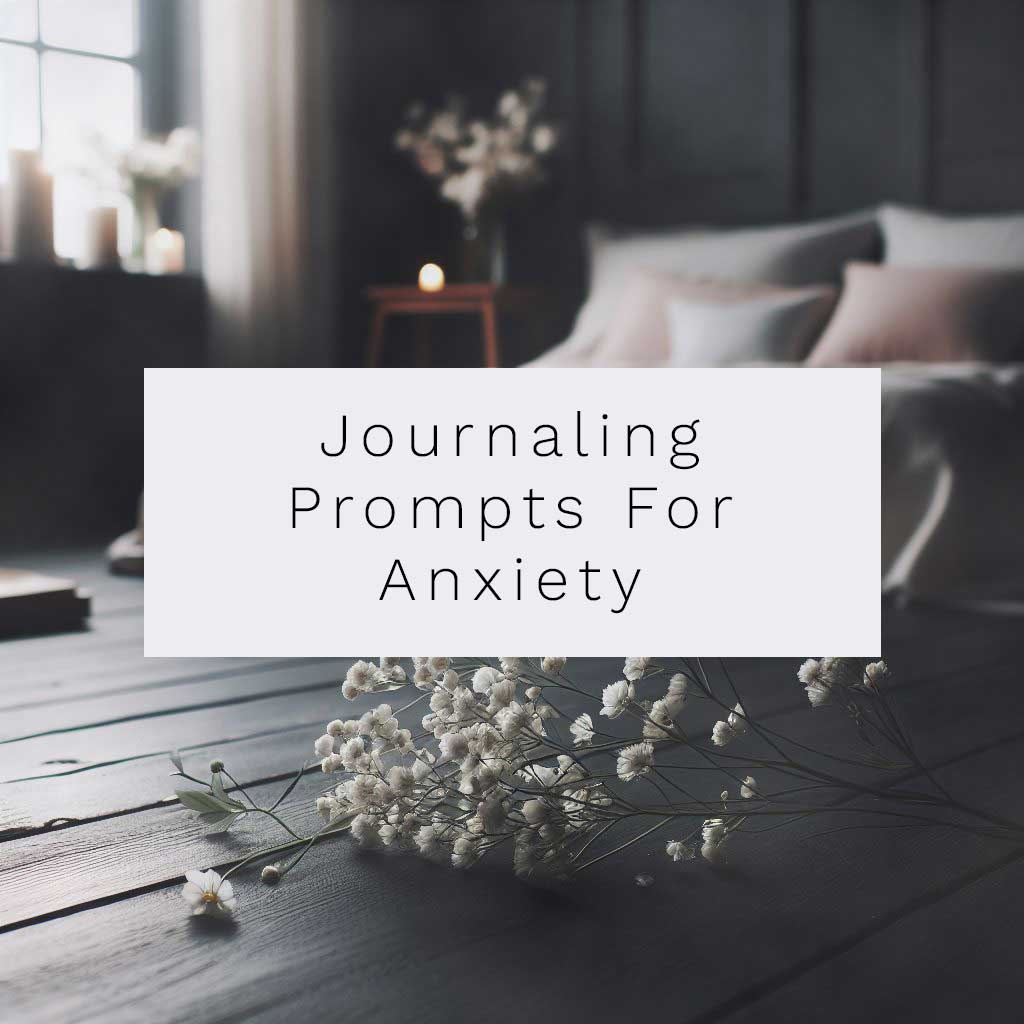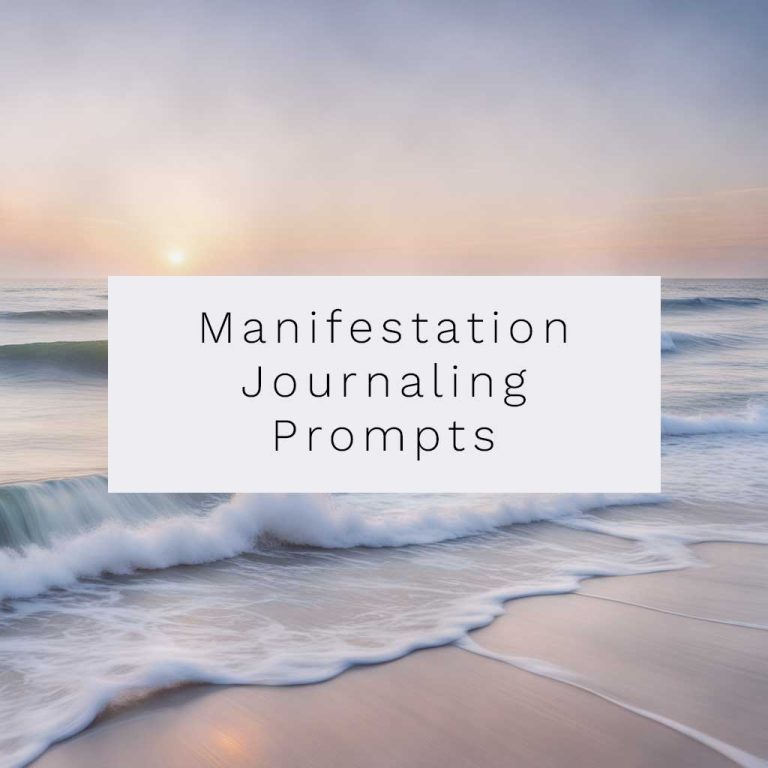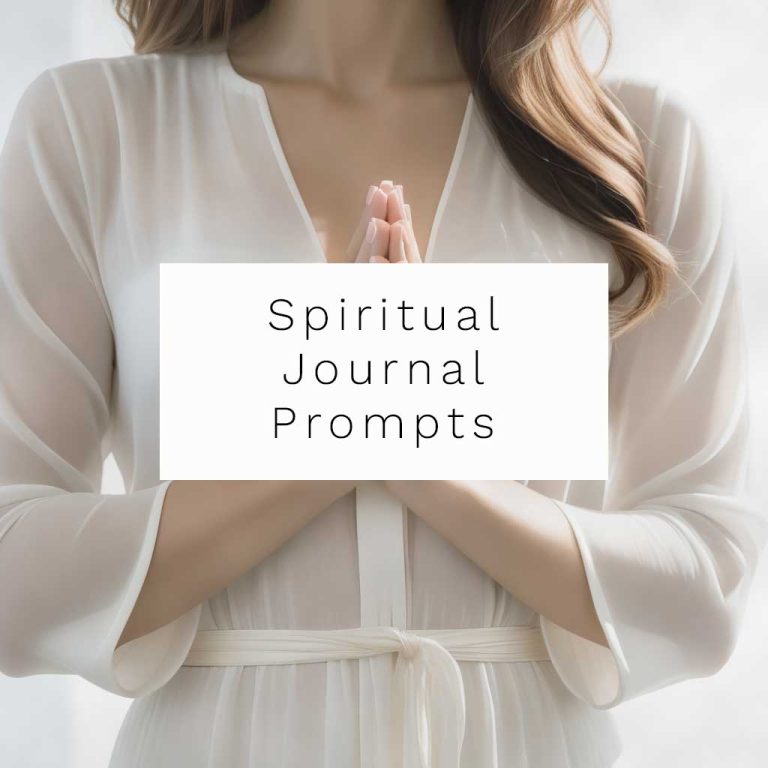

85+ Journaling Prompts For Anxiety (Including Powerful Affirmations)
If you are struggling with stress, anxiety, or any other anxiety disorder, you know how difficult it can be to quiet your mind and find peace. And, although anxiety can leave you feeling a little lost and helpless, there is one thing that has been found that can help people to process their thoughts and emotions – Journaling!
Simple as it sounds, journaling for anxiety can be a great tool in helping you manage and cope with anxiety and it can also help you to develop strategies to help you throughout your day.
That said it can sometimes be difficult to know where to start! That is why, in this article, I want to give you a few of the best journal prompts for anxiety to help you on your journey toward greater calm, clarity, and peace. And if you are curious about the benefits of journaling then check out this article!
These prompts are designed to help you explore your thoughts, emotions, and behavior when you are feeling anxious. I also hope that they will help you to create effective strategies to deal with the stress and overwhelm that sometimes go hand and hand with anxiety.
Not sure how to start? Check out this complete guide on how to start a journal
Journal Prompts For Anxiety: Understanding Your Anxiety
Understanding your anxiety and why you feel anxious is an important step in managing it and if you have been thinking about journaling to help with anxiety then I’m sure these prompts will help you because they allow you to explore your thoughts, emotions, behaviors, and anxiety triggers in a safe space.
The following anxiety journaling prompts are designed to give you insight into the underlying causes of your anxiety, identify patterns and anxiety triggers, and develop a greater sense of self-awareness.
- Think about your day. Was there a specific trigger that made you feel anxious or stressed? What anxiety symptoms did you experience? Write down what you experienced in as much detail as possible.
- What physical sensations do you experience when you are feeling anxious?
- What thoughts run through your mind when you are feeling anxious?
- What are the emotions you experience when you feel anxious?
- What is the source of your anxiety? What are the situations or triggers that cause you to feel anxious?
- What recurring or intrusive thoughts contribute to your anxiety, and are they based on facts or assumptions?
- Explore how perfectionism could contribute to your anxiety and are there ways to reframe perfectionist thoughts so that you feel less anxious?
- Think about the connection between your negative emotions and thoughts during anxious and stressful moments and how they influence each other.
- List specific situations where you feel that your anxiety is more manageable. Why do you think this is?
- Ask yourself whether there are patterns in the time of day or specific situations that tend to trigger your anxiety.
- Write about a recent situation where you felt a lack of control and how it affected your anxiety levels.
- What fears and worries do you have that contribute to your anxiety?
- Create a list of the negative thoughts or beliefs you have that contribute to your anxious feelings. Go through your list and think about whether these thoughts or beliefs are really true.
- What are some things you can do to challenge your negative thoughts and beliefs?
- Analyze your daily routine and identify any habits or activities that may be contributing to your stress and anxiety. How can you make positive adjustments to your routine so that you can reduce stress so that they don’t affect you as much?
- Think about the relationship between your diet and anxiety levels. Are there foods or beverages that seem to influence your anxiety positively or negatively?
- Ask yourself how multitasking might contribute to your anxious thoughts and experiment with focusing on one task at a time. Record the results in your anxiety journal.
- List three things that make you feel stressed and anxious in social situations and brainstorm ways to make them more manageable so that you can feel good when you are out and about.
- How do you typically respond to anxiety?
- How have stress and anxiety affected your relationships?
- How has anxiety affected your daily life?
- List three people you can trust to provide support during anxious times.
Journaling Prompts To Help You Develop Coping Strategies For Anxiety
Once you have explored the physical, emotional, and mental aspects of your anxiety you can move on to practical strategies to help you manage it. In this section, you will find anxiety journal prompts to help you identify coping strategies that you can use to tackle your anxiety head-on.
- What can you control in your environment to reduce your anxiety?
- What can you do to create a peaceful and calming environment for yourself?
- What can’t you control in your environment that causes you stress and anxiety?
- What coping strategies have you used in the past to manage your anxiety? Create a list of the ones that worked and the ones that didn’t.
- Create a list of affirmations specifically designed to help you counter negative self-talk (I have included a list of affirmations that you can use down below).
- Describe a hobby or activity that makes you feel good and helps you to relax. Think of ways that you can integrate it into your routine.
- Think about a challenge from the past where you thought you would panic and anxiety would overwhelm you but ended up coping better than expected. What strategies did you use to help you cope with this situation?
- Write about a peaceful place where you feel calm and safe. How can you mentally return to that place when you are having anxious thoughts and moments?
- Create a two-column table in your journal where you write a list of negative self-talk that you experience when you have anxious thoughts. On the right-hand side of the table, write down more realistic and positive thoughts you can use to counteract negative thinking and self-talk.
- Think about setting aside a specific time each day for worry. Allow yourself to focus on your worries only during this time of the day.
- Create a list of calming music or sounds that you can turn to when you need to relax.
- Create a list of things you can do to take breaks and practice self-care when you’re feeling emotionally overwhelmed.
- List three things you can remind yourself of when you feel anxious that will help you find yourself and reset your thoughts instead of worrying.
Journal Prompts for Self-Compassion and Acceptance
When you struggle with anxiety and depression, or any other type of anxiety disorder, it is important to be compassionate and kind towards yourself. Being kind to yourself will help you to cope that much better with difficult emotions and anxious thoughts.
Here you will find some anxiety journaling prompts and exercises to help you cope while acknowledging where you are with love and acceptance. These prompts are designed to help you develop a more positive and caring relationship with yourself and to encourage you to embrace your imperfections and humanity.
- Write a letter to your future self where you acknowledge that anxiety is a part of life and include ways in which you can be mindful and show love to yourself.
- Think about the impact that self-criticism has on your anxiety levels and brainstorm ways that you can be less critical of yourself.
- Try to imagine that someone you love deeply is struggling with anxiety, would you be as critical of them? Write a letter to that person expressing your support and love for them. Create a list of ways that you could help them and think of ways that you could offer support, compassion, and love. Now customize the list so that you can show love and support to yourself in the same way as you would support your loved one.
- Identify one small, achievable goal for today that promotes resilience and self-care while reducing stress.
- Write about a situation where you were able to accept and cope with your anxious thoughts and think about how you can apply that acceptance to other areas of your life
- Think of relaxation techniques that you have used in the past that have helped you. How can you use these to cope with anxious thoughts in the moment?
- List positive qualities and strengths that you have. Write about all the ways that these strengths and qualities contribute positively to the people around you.
- Create a list of things, no matter how small, you could do to find yourself so that you can build up your self-confidence and self-esteem.
Creative Expression For Anxiety
Learning how to express yourself creatively in your anxiety journaling can be a powerful tool for managing your anxious thoughts and building resilience.
Art, music, writing, or dance can help you to process and express feelings and emotions in a healthy way.
These activities are a great way to reduce stress and create a sense of calm and relaxation and can serve as a distraction from anxious and intrusive thoughts.
- Draw or paint a picture that represents your anxiety. What does it look like? Use colors, textures, and symbols to convey your emotions.
- Write a poem or a song to express how you feel. What words and sounds can you use to express your thoughts and feelings? What imagery can you use to convey how you feel?
- Create a collage using words, images, and textures to represent the anxiety you experience. Do you notice any themes or emotions coming through in your collage?
- Take photographs that represent your anxiety. What subjects, colors, and textures have you used to express yourself? How do they make you feel?
- Choreograph a dance that explores your feelings and emotions. What movements and gestures do you use to convey your anxious thoughts?
Gratitude and Positive Visualization
The following section has a list of journaling prompts and exercises to help you focus your mind on positive images and scenarios which can help you to create a sense of calm and optimism in your life, all while reducing feelings of anxiety and stress.
Try to take a few minutes each day to close your eyes, breathe, relax, and then write about positive scenes that you envision. This simple exercise can help you to train your mind to focus on the positive aspects and future hopes for your life.
- Create a daily gratitude journal where you write down at least three things you are grateful for each day. If you need help getting started then check out our full gratitude journaling prompts guide.
- Close your eyes and visualize yourself calmly going through a difficult situation. It could be anything from a difficult conversation with a loved one to a stressful work presentation. Imagine yourself approaching the situation with confidence and see yourself handling it with ease. Open your eyes and write down how you felt, how others reacted to your calm composure, and what the positive outcomes of the situation were.
- Imagine yourself surrounded by supportive and loving people. Visualize their smiling faces and kind words. Allow yourself to feel grateful and uplifted by their kindness. Write down how you feel and why you appreciate these people in your life.
- Visualize yourself confidently achieving a long-term goal or dream. See yourself successfully taking the steps needed to achieve the goal including the sense of accomplishment and pride that comes with the success. Write down how you feel including the positive impact achieving this goal has on your life and those around you.
- Imagine yourself in a perfect state of health and well-being. Visualize yourself feeling vibrant, energized, and full of life! Notice how your body feels strong and capable and your mind is clear and focused. Write down how you feel in this moment and allow yourself to feel grateful for the body that you have been given.
Setting Boundaries
No matter whether you suffer from an anxiety disorder or not, setting healthy boundaries is essential in creating healthy relationships and protecting your own emotional and mental health.
Establishing healthy boundaries can help you avoid feeling overwhelmed, resentful, burnt out, guilty, or exploited. Boundaries can also help you to communicate your needs and expectations clearly to the people in your life.
Here you will find journaling prompts to help you identify areas where you need to set boundaries and how you can do so without feeling like you are letting those around you down.
- What are some situations or relationships in which you struggle to set boundaries? Why do you think this is the case?
- What are some common thoughts or beliefs that come up for you when you consider setting boundaries? Do these thoughts help or hinder your ability to set boundaries?
- What are some emotions that you experience when you set boundaries? How do these emotions affect your anxiety?
- Write down three things you can do to communicate the boundaries you have set to the people in your life.
- Think about situations when people don’t respect your boundaries. Does this happen regularly? Are these people aware of what your boundaries are?
- Write a list of ways that you can let people know exactly what your boundaries are. Think about how you can maintain your boundaries once you have communicated what they are.
- Write down a list of areas in your life where you would like to set better boundaries. What steps can you take to establish and maintain these boundaries?
- Think about situations where you have felt overwhelmed due to a lack of boundaries. How can you establish healthier limits in those areas?
- Visualize a “mental safe space” that you can retreat to in moments when you feel overwhelmed by anxiety. Describe this place in detail so that you can think about it when you need to.
Reflect On Your Progress
One of the most powerful benefits of keeping a journal for anxiety is the ability to look back and track your progress over time – sometimes you just don’t realize how far you have come!
By regularly writing in your anxiety journal you can monitor your thoughts, feelings, stressors, and the anxiety symptoms that you experience. This helps you to track your progress, manage stress, and celebrate successes as well as identify areas where you can improve.
Here you will find some journaling prompts that can help you reflect on your progress as you work towards managing your anxiety on a daily basis.
- Go through your past journal entries and make notes about any patterns you notice or progress that you’ve made.
- Looking back over the past week/month/year, what are some changes you’ve noticed in your anxiety levels or symptoms? What do you think has contributed to these changes?
- Write a list of things that you’re proud of yourself for accomplishing, despite your anxiety. How have these accomplishments made you feel, and how have they impacted your overall mental health?
- What are some of the things that you are grateful for, despite your anxiety? How have these things helped you cope with your anxiety?
- What have you learned about yourself and your anxiety through journaling? How have these insights helped you manage your anxiety?
- Are there any patterns or habits that you’ve noticed in your anxiety journaling that could be holding you back from making progress? What steps can you take to break these patterns and continue to move forward?
- Looking ahead, what are some goals that you have for managing your anxiety in the future? What steps can you take to achieve these goals, and how can you hold yourself accountable for making progress?
Affirmations To Include in Your Anxiety Journaling
Affirmations are powerful statements that can help you reframe your thinking and the beliefs you have about yourself and your anxious thoughts. By using positive thinking and affirmations in your anxiety journaling you can begin to shift your mindset, create a more positive mindset, and reduce your stress levels which will help you to feel more empowered and confident.
Here you will find a list of affirmations that you can include in your journal and in your daily life. Choose affirmations that resonate with you and make you feel good emotionally. Remember to repeat them regularly.
- I am strong and can manage my anxiety.
- I trust myself to handle whatever life throws my way.
- I am not alone in my struggles, and there is support available to me.
- I am doing the best I can do, and that is enough.
- I am deserving of love, care, and compassion, both from myself and others.
- I am grateful for my life and the people in it, and I choose to focus on the positive aspects.
- I am confident in my ability to overcome my anxiety and live a fulfilling life.
- I am safe and can manage my anxiety without fear.
- I release the need to control everything and embrace the uncertainty of life.
- I trust in my ability to cope with whatever comes my way.
- I am worthy of love, care, and happiness, and I choose to prioritize my own well-being.
- I am able to find joy and happiness in the present moment, and I choose to focus on the positive aspects of my life.
- I am in control of my thoughts and choose to focus on the present moment.
- I accept myself as I am – Imperfections and all!
- I am not my thoughts; I can choose to let go of negative thinking patterns.
- I trust the process of life and let go of the need for constant reassurance.
- I am surrounded by love and support, even in challenging times.
- I am free from the grip of anxiety, and I allow myself to experience calmness.
- I am capable, and I trust in my ability to handle whatever comes my way.
- I release all the tension and anxiety in my body and mind.
- I choose peace over worry, and I release the need to anticipate negative outcomes.
- I am deserving of a life filled with joy, love, and positive experiences.
- My mind is clear, and I am in control of my thoughts and emotions.
- I am grounded, centered, and supported by the energy of the earth.
- I release fear and embrace the power of my own positive intentions.
- I am a magnet for positivity, and I attract calm and peaceful energy.
- I release old habits that no longer serve me and create space for new, positive experiences.
- I am the master of my thoughts, and I choose positive and loving thoughts.
Conclusion
I really hope that you enjoyed this article and found these journaling prompts helpful in gaining insight into your anxiety and how you can manage it. Remember there is no right or wrong way to journal so give some of these prompts a try. Find the ones that resonate with you and inspire you to reflect and grow. I am confident that with time and practice, journaling about your anxiety will become a valuable tool for managing it and improving your mental health and well-being.


